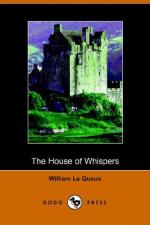She had dashed away her tears with the little wisp of lace, annoyed with herself at betraying her indignation in that womanly way. She knew him, alas! too well. She mistrusted him, for she was well aware of how cleverly he had once conspired with Lady Heyburn, and with what ingenuity she herself had been drawn into the disgraceful and amazing affair.
True it was that her story, if told in a criminal court, would prove so extraordinary that it would not be believed; true also that he would, of course, deny it, and that his denial would be borne out by the woman who, though her father’s wife, was his worst enemy.
The man placed his hand on her shoulder, saying, “May we not be friends, Gabrielle?”
She shook him off roughly, responding in the negative.
“But we are not enemies—I mean we will not be enemies as we have been, shall we?” he urged.
To this she made no reply. She only quickened her pace, for the twilight was fast deepening, and she wished to be back again at her aunt’s house.
Why had that man followed her? Why, indeed, had he troubled to come there? She could not discern his motive.
They walked together in silence. He was watching her face, reading it like a book.
Then, when they neared the first thatched cottage at the entrance to the village, he halted, asking, “May we not now become friends, Gabrielle? Will you not listen, and take my advice? Or will you still remain buried here?”
“I have nothing further to say, Mr. Flockart, than what I have already said,” was her defiant response. “I shall act as I think best.”
“And you will dare to speak, and place yourself in a ridiculous position, you mean?”
“I shall use my own judgment in defending my father from his enemies,” was her cold response as, with a slight shrug of her shoulders, she turned and left him, hurrying forward in the darkening twilight along the village street to her aunt’s home.
He, on his part, turned upon his heel with a muttered remark and set out again to walk towards Nassington Station, whence, after nearly an hour’s wait in the village inn, he took train to Peterborough.
The girl had once again defied him.
CHAPTER XXVIII
THE WHISPERS AGAIN
Was it really true what Flockart had told her? Did Walter actually wish to see her again? At one moment she believed in her lover’s strong, passionate devotion to her, for had she not seen it displayed in a hundred different ways? But the next she recollected how that man Flockart had taken advantage of her youth and inexperience in the past, how he had often lied so circumstantially that she had believed his words to be the truth. Once, indeed, he had openly declared to her that one of his maxims was never to tell the truth unless obliged. After dinner, a simple meal served in the poky little




